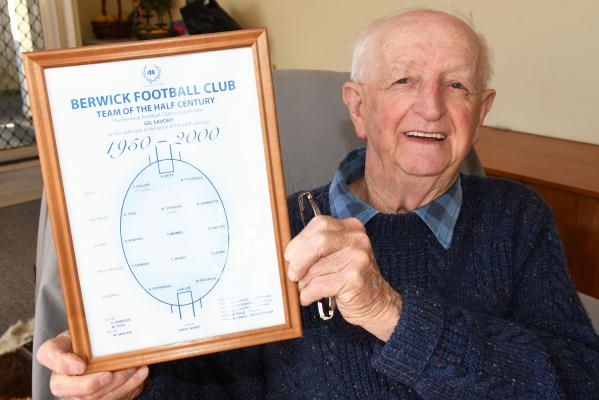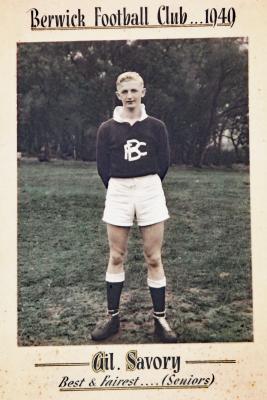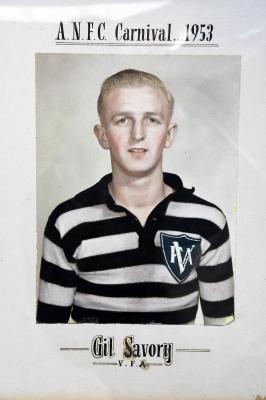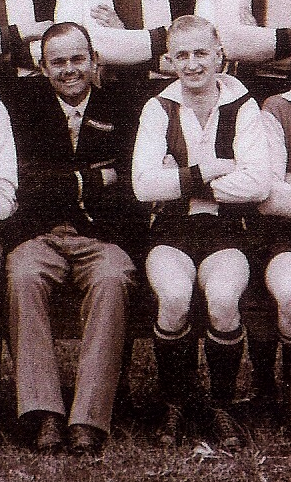
By David Nagel
Gil Savory may be 90 years old but is still as sharp as he was when a blonde-bomber cut a swathe through the burgeoning South West Gippsland Football League (SWGFL) competition for Rythdale-Cardinia in the mid 1950’s.
Savory was – and always will be – the first undisputed superstar of the SWGFL which began its long and decorated history in 1954.
Savory is one of only five, three-time Norm Walker Medallists, joining Madi Andrews (Berwick 2015, 17, 18), Scott Meyer (Beaconsfield 2013, 14, 16), Billy Morrison (Tooradin-Dalmore 1971, 72, 74) and David Wade (Narre Hallam 1983, 84, 88) on an exclusive list of champions to win a trio of league best and fairest awards in the SWGFL and subsequent adaptations of the league.
The story of Gil Savory is quite phenomenal…and it’s a story that led him to within a hair’s-breadth of earning All-Australian selection in 1953.
Savory was born on June 22, 1931, and – alongside his five brothers and two sisters – grew up in Upper Beaconsfield and Berwick and attended the State Schools of both townships before gaining his first taste of football at the Dandenong High School.
“At Berwick State School we had a teacher that was interested in gardening, so our recreation time, instead of playing football, cricket or whatever, was spent weeding his garden,” Savory says with a chuckle.
“I didn’t kick a football until I was 14, and that was kick-to-kick at lunchtime at Dandenong High, so no competition or anything.”
But Savory soon made up for lost time and was a driving force behind the development of one of the first official junior competitions in the region.
“When I was 15 or 16, somebody wanted to get a football game going for the kids, between Beaconsfield and Berwick, and I did the organising so us kids could play,” he explained.
“You wouldn’t find anything in the paper about it, I kept it pretty low key, but I just went around asking kids if they would like to play football.
“That started off a junior competition in the Dandenong District, Berwick was included, and within about two years every town had a team. It was just something I organised from home, they made me captain of the Berwick team and that was the start of things really.”
That early Berwick junior team struggled to win games, but a young Savory soon stood out from the crowd with his explosive speed cutting opposition teams to shreds.
He was quickly under the eye of the senior club and won the Berwick senior best and fairest award as a spritely 18-year-old in 1949. His exciting talents were then recognised by VFL club Richmond, who invited Savory to Punt Road for the 1950 season.
“I played in the seconds for most of the time at Richmond because I was suffering the effects of tonsilitis…I was ill most of the time so I didn’t play very much, and when I did, I felt crook,” he said.
Due to his ongoing ailment Richmond organised for Savory to make the move to Oakleigh in the VFA mid-way through 1951. He had his tonsils removed and soon started to show his full potential, playing five games in the Oakleigh reserves and polling a perfect 15 votes in the league best and fairest award.
Richmond soon requested his return, but Oakleigh resisted and Savory played a key role, from the wing, in the purple and golds’ 1952 VFA premiership win over Port Melbourne.
Savory has some mixed memories from one of his best days in football, which was also one of the toughest.
“It was great to win the premiership but my memories are I got flattened by a big bloke, about six-foot two-inches tall and 17 stone, he punched me right between the eyes and knocked me rotten,” Savory explained with a signature chuckle.
“You hear about people seeing stars, well I saw every bloody one of them that day…I got going again but that slowed me down for quite a bit.
“He was a really nice bloke off the field, Bomber Murray was his name, but he had a reputation for doing those types of things. People used to belt you, kick you, do all sorts of horrible things while the ball was nowhere near you and Port Melbourne supporters even chucked rocks at us one day.
“But apart from that silly stuff it was good tough football. I don’t mean this disparagingly, but it was a lot tougher than it is today.”
Savory’s fantastic season for Oakleigh in 1952, and great start to the ’53 season, saw him selected in the VFA team for the Australian National Football Championships held at the Adelaide Oval in early July that year.
Five teams played in the carnival that saw 10 games played over an 11-day stretch, with two teams from Victoria – VFL and VFA – taking on the best of the best from South Australia, Tasmania and Western Australia.
Savory took to the field against some all-time legends of the game including Essendon trio Bill Hutchison, Jack Clarke and John Coleman.
Ron Clegg (South Melbourne), Charlie Sutton (Footscray), Fos Williams (Port Adelaide), Bill Stephen (Fitzroy), Bernie Smith (Geelong), Bob Rose (Collingwood) and Ken Hands (Carlton) were other champions to share the same sporting stage with the Berwick local.
But Savory would more than hold his own, finishing equal-second in the prestigious Tassie Medal – presented to the best player at the carnival – behind Western Australia’s Merv McIntosh.
Hutchison, and Tasmania’s John Leedham, would tie with Savory in second place.
Hutchison, Leedham and McIntosh would earn All-Australian selection, with Savory narrowly missing out on the rare honour.
“Honestly it didn’t fuss me playing against those blokes, it didn’t make any difference to me what their name was, I just played football and played pretty well that week,” Savory remembers.
“It was obviously a great standard of football but I always used to think that the better the standard I played in, the better that I performed.
“I did have a great carnival, but did have a pretty bad injury towards the end. I had to have a jab in my back before the game, and at half and three-quarter time, just to numb the pain.”
The unflappable Savory played in front of a then record Adelaide crowd of 52,632 that turned out to see a double-header on the final day of the carnival.
Savory’s VFA team would go down to Western Australia – 12.8 (80) to 8.14 (62) – before a star-studded VFL team secured the Australian championships with a 19.16 (130) to 4.7 (31) victory over South Australia.
“I just saw it as another game of football I was playing in and the big crowd didn’t bother me that day at all,” Savory said.
“John Coleman didn’t get in that All-Australian team, that’s how strong it was, and neither did I, but I was nominated by the South Australian press but not by the actual selectors.
“To tell you the truth, those things didn’t worry me that much, I just loved playing football.”
Savory stayed at Oakleigh until the end of 1954, but along the way did some serious and ongoing damage to his shoulder, which, during his time at Warragul Road, he dislocated three times.
Soon, with shoulder injuries mounting, Oakleigh also gave him his marching orders.
“That was disappointing because they (Oakleigh) should have put me in hospital and got it fixed up, but they never did and it affected my playing career from then on,” Savory recalls.
“I played with a shoulder that was very dicey from that point forward. I couldn’t have played with Oakleigh the way my shoulder was, but at a lower level I could manage it.”
After almost being All-Australian just two years earlier, he make his way to the country surrounds of Rythdale Cardinia for the 1955 season.
“I’d not long been married (to Althea), I was interested in money, had a crook shoulder, and they were looking for a coach,” Savory said.
“A bloke called Ted Moresby was pretty good at organising things, he lived in Berwick, and told me that Rythdale Cardinia might want me to be their coach.
“He organised for them to come and see me and they offered me 10-quid a week, which was pretty good money back then. They had basketball (netball) for the girls and it was a really good club to be around.
“They were lovely people, the population there was great. They would invite us around for dinner after the game, they were just good country people at heart, like most country people are.”
Savory would have an immediate impact on his new club, helping Rythdale Cardinia to its first ever premiership in its history, and along the way would win his first Norm Walker Medal and be voted the best player on the ground in the premiership win that year.
“We won the premiership, so it was the perfect start to my coaching career, but I don’t think I was a flash coach, I think I was more value to the club as a player,” he said.
“But the premiership did mean a lot to people. I was regarded as the King of Rythdale and a bit of a hero around the town for a while (joking and chuckling).
“We didn’t go over the top. I’d have a few beers with the players and supporters but didn’t drink much, it was just a game that we had to win and the first ever premiership for the club.”
Savory, who played most of his early football on the wing, patrolled the muddy centre at Rythdale Cardinia and became the dominant figure in the early days of the SWGFL.
With his high level of play, and healthy blonde locks, the 5ft-9 (175cm) and 11 stone (70 kilos) Savory would become a target for opposition clubs.
“I would get whacked from all angles, and kicked in the back of the leg a lot of times too,” Savory recalls.
“I ended up with a broken cheekbone in one place on one occasion, and had it broken in three places on another, all from being punched in the face behind play.
“I told my players there would never be fighting, to play the game fair, so it made it hard to whack them back.
“But they had to catch me first. I was pretty quick back then and had decent skills. I could kick well and kick straight. I was a right foot kick but practiced on my left until I got pretty good on that side as well.”
Savory said tactics certainly played a part in the mid 1950’s, but didn’t overwhelm or consume things as they do today.
“It was so much different then…now they have coaches for so many different things but back then we had one coach who did everything,” he said.
“Depending on who we were playing we would have different tactics.
“Cranbourne had a really good full forward at one stage so we put our best player on him and then have a back-pocket player coming in and scouting the pack, that was his job. It wasn’t like it is today but tactics were still important back then.”
Savory would play three years at Rythdale Cardinia – winning the Norm Walker Medal on all three occasions.
Walker, who was the first administrator of the SWGFL, which commenced in 1954, also played a key role in getting Savory to Rythdale Cardinia in his role as club president.
“He was a really nice bloke and very high up in the league as well,” Savory remembers.
“He would always say he could never understand how Oakleigh let me go, to get to Rythdale Cardinia. I had a reasonably good record as a player at Oakleigh but I understood they couldn’t keep me while I had a crook shoulder.
“I could play at that standard (SWGFL) without using my shoulder that much…two legs and one arm they used to say. But it did used to pop out occasionally at Rythdale and there’s no way I could have stayed on at the higher level.
“He (Walker) was a hell of a nice fellow and I played cricket against him when he was at Rythdale and I played for Berwick.”
So, his he proud of his Norm Walker Medals?
“I am, but I didn’t actually get a medal,” Savory says with a laugh.
“The first thing I got was a smokers’ fan, which was quite nice and a pretty valuable thing back then, and I got a cup, a trophy, in one of the other years.
“I can’t remember what the third prize was but I do recall it was presented at a grand final that we weren’t playing in.”
Savory finished up at Rythdale Cardinia at the conclusion of the 1957 season, before coaching Upwey-Tecoma in the then Mountain District League for one year.
“I coached there for one year and it didn’t matter what I did or said, all those players ever wanted to do was fight,” he said with a chuckle.
“They wanted to fight the opposition first, but if that didn’t work, they’d start a fight between themselves.”
Savoury then coached at Berwick for two years, in 1959 and ’60, before pulling the pin on a stellar career at what would be now considered a very young age.
A growing family, and concentrating on gaining promotion in his office work with the SEC (State Electricity Commission) – where he worked for 41 years – would take priority over his football.
“From Melbourne, I got transferred to Ballarat and I always said I would give up playing football when I was 28, that’s what you did back then,” he said.
“I had a couple of children by then and felt it a bit unfair for me to be getting belted around every week and maybe not come home. We stayed in Ballarat for 12 months, then went to Traralgon and Colac, and every time we switched towns they would ask me to play football.”
Savory and his wife Althea currently live in Mornington, have for the last 13 years, and have three children, Leanne, Althea and Linda.
Gil’s brother Hubert was also a star footballer with both Berwick and Dandenong.
For someone so good at the game, Savory has never supported a VFL or AFL club, preferring to play the game in his prime instead of watch it.
He has slowly mellowed that approach over the years and will now watch games on TV.
Savory’s sporting prowess didn’t end with his football.
He was also a menacing opening bowler for the Berwick Cricket Club, winning senior premierships at the club and took 7/9 and 2/2 one day in a final. He was also a dab hand at tennis and golf until a knee injury finally started to slow him down.
In 2000, he was selected on the wing in the Berwick Football Club Team of the Half Century – from 1950 to 2000.
So, is the superstar sportsman proud of his sporting career when he takes a look back these days?
“Seriously, it doesn’t define me or bother me at all. If anyone ever asks if played football I just say yes, I did, and occasionally I might say I was pretty good at it, but that’s it.”
Gil Savory is a modest superstar, only praising himself when prodded, and was the first true champion player of the South West Gippsland Football League.
And he is still sharp, like his opening bowling was…and when a blonde-bomber cut a swathe through the SWGFL in the mid 1950’s.
Well done Gil Savory, on a brilliant career!










